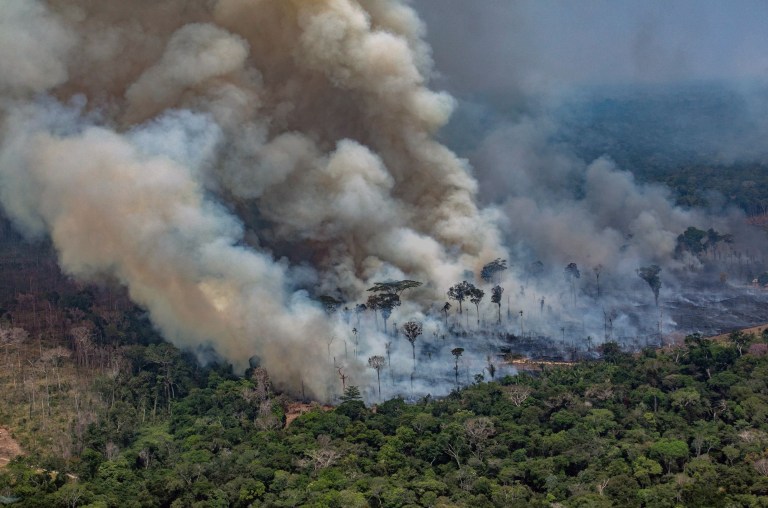Over the summer, social media cried out for governments around the world to save the Amazon from the wildfires destroying it. Two months later, the world seems to have moved on. However, this tragedy is still a reality…
Just two months ago, you would have been forgiven for thinking that everybody had given up their day jobs or studies in favour of becoming a full-time advocate for Greenpeace. Over the summer, outraged screams of “Save the Amazon!”, “The Amazon is burning!”, “The world’s lungs are dying!” dominated social media newsfeeds from just about anyone with access to Wi-Fi. Now, of course, things have died down – however, the Amazonian fires rage on and the rainforest is, in fact, being consumed more rapidly now than ever.
At the end of August, under national and international pressure from a world horrified to learn of the 196% increase in fires compared to the previous August, Brazilian president Jair Bolsonaro put into place his ‘Operation Green’ plan. On the face of it, this 60-day military deployment initiative aimed at enforcing a temporary ban on setting fires in the Amazon was a success. According to the number one Brazilian media outlet Globo, between the end of August and 24th October, patrols managed to put out 450 fires in the Amazonian region as well as seize various tools and machinery used in illegal logging operations. Accordingly, the international media, already hyperactively on the hunt for the next big story, was appeased by the figures showing September as having a decreased number of fires compared to the previous year. The world quickly lost interest.
Nonetheless, according to the World Wildlife Fund (WWF), this only scrapes the surface of the problem and deforestation alerts have actually increased. Crucially, what matters is not the fires but the deforestation itself. According to Ane Alencar, Science Director at the non-profit organisation Amazon Environmental Research Institute (IPAM), the typical method for deforestation in the Amazon is that the trees are felled, left to dry and then burned. Therefore, arguably, ‘Operation Green’ only served to prevent the burning of the trees that had already been felled. In all likelihood, these will instead be either simply burned later this year or left for the next dry season.
It’s also important not to forget the other countries sharing responsibility. In the Cerrado Savannah – one of the most biodiverse tropical savannahs on the planet, shared by Brazil, Bolivia and Paraguay – the destruction continues, upsetting an already delicate ecosystem. On top of this, Bolivian President Evo Morales recently introduced a decree allowing farmers to clear four times more land than before. The message is clear: much damage is already done, and the destruction is ongoing.

Brazil’s relationship with the Amazon paints a complicated picture that has become more tainted still with the landslide election of Jair Bolsonaro in 2018. Bolsonaro rode to victory on a wave of social conservatism. He was long side-lined in politics for his controversial views on women, the LGBT+ community, Afro-Brazilians and immigrants, and campaigned on a promise of economic reform after frustrating years of economic decline under a left-wing government.
Bolsonaro is a staunch climate change denier, with one Brazilian publication claiming that in the face of undeniable evidence as to the existence of an approaching global catastrophe, he prefers to “burn the thermometer rather than fight the fever”. He originally tried to claim that the fires were a normal part of the dry season, and his dismissal of environmental concerns escalated violence in a region already fraught with turbulence.
In 2016, Green Peace USA claimed that the year before, Brazil was the most dangerous country for environmentalists, accounting for 30% of global murders of activists. The Human Rights Watch insists that Bolsonaro’s environmental policies have helped to further embolden those wishing to seize land and clear it for profit. Acts of violence against those currently occupying the area, be that indigenous tribes, rubber tappers or small landowners, have increased dramatically since Bolsonaro’s election. He has portrayed environmental concerns as a barrier to economic development, relieving environmental NGOs of their powers, as well as blaming them for environmental degradation and encouraging the expansion of agriculture.
To make things worse, the underlying fears of outside threats to Brazilian sovereignty that have historically pervaded Brazilian society have meant that Bolsonaro has been able to belittle international outrage. He hit the headlines in August after he accused French President Emmanuel Macron of having an “unacceptable colonialist mentality” (in response to Macron’s speech at the G7 summit during which he famously said “our house is burning”) and then refused to accept 20 million dollars of G7 aid unless Macron apologised.
Perhaps Bolsonaro is right to be worried. Some academics have highlighted how Article 42 of the charter of the United Nations Security Council could be interpreted to justify an invasion of Brazil should there be a majority vote among members that the threat to the Amazon constitutes a breach of international security. For now, that is surely an extreme surrealist view of a future that seems unrealistic given the current political climate. However, one thing is certain at present: whilst the world frets and argues about the course of action to take, preoccupied by fickle international interests, the Amazon fires rage on.
[Image Credit: AFP]

